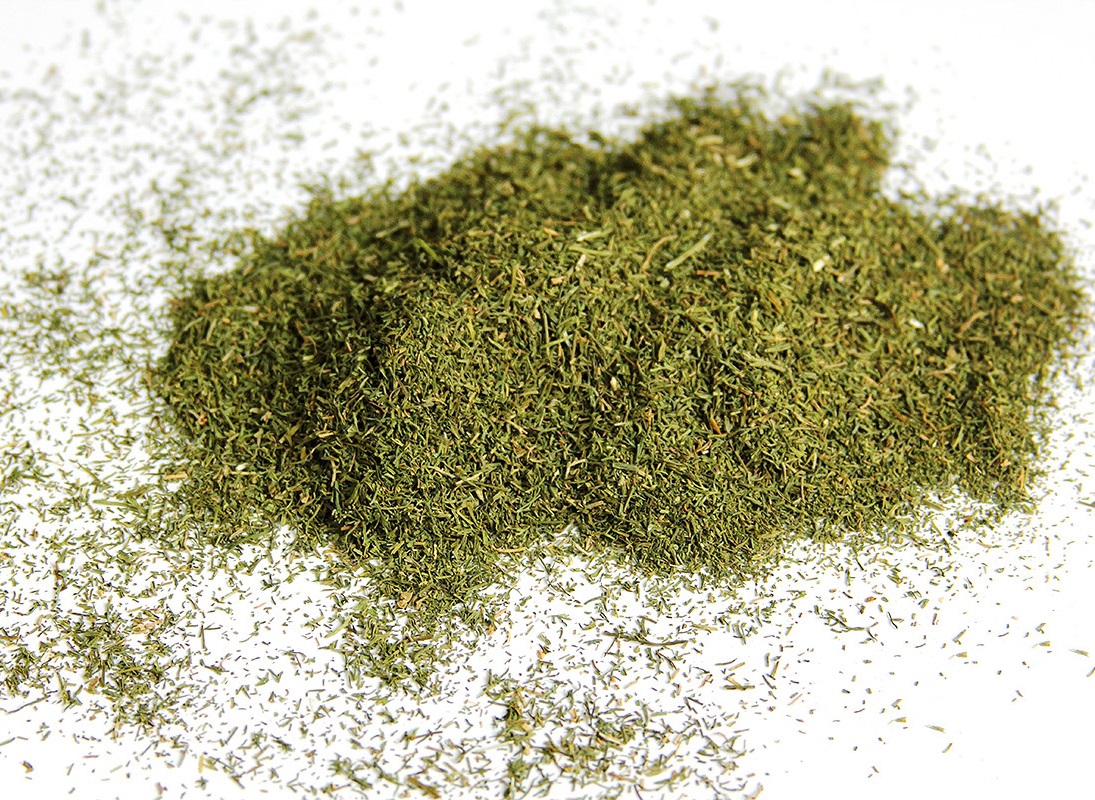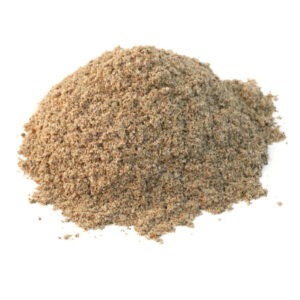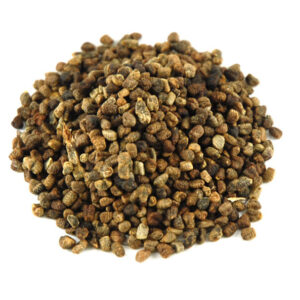Description
Dill weed is a unique perennial herb with pleasant anise-like flavor. Its sprigs (leaves) as well as seeds are employed as seasoning in various cuisines worldwide. Dill is the member in the Umbelliferae family, a large group of flowering herbs and spices that also includes caraway, parsley, cumin, fennel, etc.
Botanically, dill belongs to the family of Apiaceae, in the genus: Anethum, and scientifically named as Anethum graveolens.
Dill is native to Mediterranean and Eastern-European regions. Just like in cilantro, it too requires warm summer climates with well-drained fertile soil to flourish. It grows 1 to 2 feet in height and features dark-green leaves (sprigs) that are wispy and fern-like, have a soft texture with rich pleasant anise aroma and sweet taste.
Dill seeds, used as condiment spice, are similar in taste and appearance to “caraway seeds.” They feature light brown color, oval shape with vertical ridges and flavor that is aromatic, sweet, and citrus, but also slight bitterly.
Health benefits of dill
- Dill weed contains numerous plant derived chemical compounds that are known to have been anti-oxidant, disease preventing, and health promoting properties.
- This popular herb contains no cholesterol and is very low in calories. Nonetheless, it holds many anti-oxidants, vitamins like niacin, pyridoxine, etc., and dietary fibers, which help in controlling blood cholesterol levels.
- Dill leaves (sprigs) and seeds carry many essential volatile oils such as d-carvone, dillapiol, DHC, eugenol, limonene, terpinene and myristicin.
- The essential oil, Eugenol in the dill has been in therapeutic usage as local-anesthetic and anti-septic. Eugenol has also been found to reduce blood sugar levels in diabetics. (Further detailed studies, however, require to establish its role.)
- Dill oil, extracted from dill seeds has anti-spasmodic, carminative, digestive, disinfectant, galactagogue (helps breast milk secretion), and sedative properties.
- It is also rich in many vital vitamins, including folic acid, riboflavin, niacin, vitamin A, ß-carotene, vitamin-C that is essential for optimum metabolism inside the human body.
- Vitamin-A, and beta carotene are natural flavonoid antioxidants. 100 g of dill weed sprigs provide 7718 IU or 257% of recommended-daily levels of this vitamin. Vitamin A is also required for maintaining healthy mucus membranes and skin, and is essential for good vision. Consumption of natural foods rich in flavonoids helps the human body to protect from lung and oral cavity cancers.
- Fresh dill herb is an excellent source of antioxidant vitamin, vitamin-C. 100 g contain about 85 mg or 140% of vitamin C. Vitamin-C helps human body develop resistance against infectious agents and scavenge harmful, pro-inflammatory free radicals.
- Dill weed is a good source of minerals like copper, potassium, calcium, manganese, iron, and magnesium. Copper is a cofactor for many vital enzymes, including cytochrome c-oxidase and superoxide dismutase (other minerals function as cofactors for this enzyme are manganese and zinc). Zinc is a co-factor in many enzymes that regulate growth and development, digestion and nucleic acid synthesis. Potassium is an important component of cell and body fluids that helps control heart rate and blood pressure. Manganese is used by the body as a co-factor for the antioxidant enzyme, superoxide dismutase.
Dill herb has all the characters to consider it has one of the most valuable functional foods. 100 g of dill weed provides only 43 calories, but its phyto-nutrients profile is no less than any other high-calorie food source; be it nuts, pulses, cereals, or meat group.
100 g fo this herb provides (%of RDA per 100 g):
37.5% of folates (vitamin B11),
14% of vitamin B-6 (pyridoxine),
23% of riboflavin (vitamin B-2),
140% of vitamin-C,
257% of vitamin-A,
21% of calcium,
82% of iron and
55% of manganese.
(Note: RDA- Recommended daily allowance)
Selection and storage
Fresh dill weed as well as dill seeds can be available in the markets all around the year. Try to buy fresh dill sprigs, since it is superior in flavor and rich in many vital vitamins and anti-oxidants such as ß-carotene, vitamin-C, folates, etc.
Fresh dill should feature vibrant green color sprigs, and firm stems. It should be free from any kind of spoilage/bruises or yellowing. Buy dill that has been grown using organic techniques since this will give you more assurance of pesticide free, aromatic, as well as nutritious sprigs.
At home, fresh dill weed should be stored inside the refrigerator kept in a zip pouch or wrapped in a slightly damp paper towel and should be used as early as possible since it loses flavor and nutrients quickly if kept for longer periods.
In the stores, buy whole dill seeds instead of its powder since oftentimes it may get adulterated with other spicy powders. The seeds can be stored in cool, dry, dark place inside airtight containers for many months and can be milled using hand-mill as and when required. Ground and powdered form should be stored inside the refrigerator in airtight containers and should be used as early as possible since it loses flavor rather quickly.Dill seeds as well as dill oils can also available in the markets. The seeds used as spice and condiment. Good-quality dill seeds release pleasant, sweet and slightly peppery flavor when rubbed between index and thumb fingers.
Medicinal uses
- The sprigs of the dill weed have anti-septic, digestive, and carminative properties.
- The essential oil, eugenol, in the dill has been in therapeutic use as local anesthetic and anti-septic. Eugenol also has been found to reduce blood sugar levels in diabetics, however, further detailed studies required to establish its role.
- Dill oil, extracted from dill seeds, has been in use in traditional medicines as anti-spasmodic, carminative, appetizer, digestive, disinfectant, to help increase breast milk secretion in nursing mothers and to relieve neurological symptoms like headaches and nervous irritability. Along with caraway, fennel, aniseed, it too is one of the most important ingredients in gripe water preparation.
Culinary uses
Fresh dill weed should be washed thoroughly in the water in order to remove sand and dirt and to rid off any residual pesticides. In order to keep the fragrance and aromatic flavor intact, dill is generally added just before preparing recipes.
Here are some preparation tips:
- Dill weed herb has been used in preparation of many popular dishes in Mediterranean and European cuisine since ancient times. Along with other spicy items, it is being used to enhance the flavor and taste of vegetables, chicken, fish and meat dishes.
- Dill has also been used in the preparation of soups, and sauces.
- Freshly chopped and sautéed dill is a great addition to green salads.
- Dill seeds are used in pickling as well as in spicy dishes.




Reviews
There are no reviews yet.